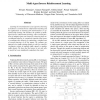Free Online Productivity Tools
i2Speak
i2Symbol
i2OCR
iTex2Img
iWeb2Print
iWeb2Shot
i2Type
iPdf2Split
iPdf2Merge
i2Bopomofo
i2Arabic
i2Style
i2Image
i2PDF
iLatex2Rtf
Sci2ools
143
click to vote
ICMLA
2010
2010
Multi-Agent Inverse Reinforcement Learning
Learning the reward function of an agent by observing its behavior is termed inverse reinforcement learning and has applications in learning from demonstration or apprenticeship learning. We introduce the problem of multiagent inverse reinforcement learning, where reward functions of multiple agents are learned by observing their uncoordinated behavior. A centralized controller then learns to coordinate their behavior by optimizing a weighted sum of reward functions of all the agents. We evaluate our approach on a traffic-routing domain, in which a controller coordinates actions of multiple traffic signals to regulate traffic density. We show that the learner is not only able to match but even significantly outperform the expert.
Related Content
| Added | 12 Feb 2011 |
| Updated | 12 Feb 2011 |
| Type | Journal |
| Year | 2010 |
| Where | ICMLA |
| Authors | Sriraam Natarajan, Gautam Kunapuli, Kshitij Judah, Prasad Tadepalli, Kristian Kersting, Jude W. Shavlik |
Comments (0)

